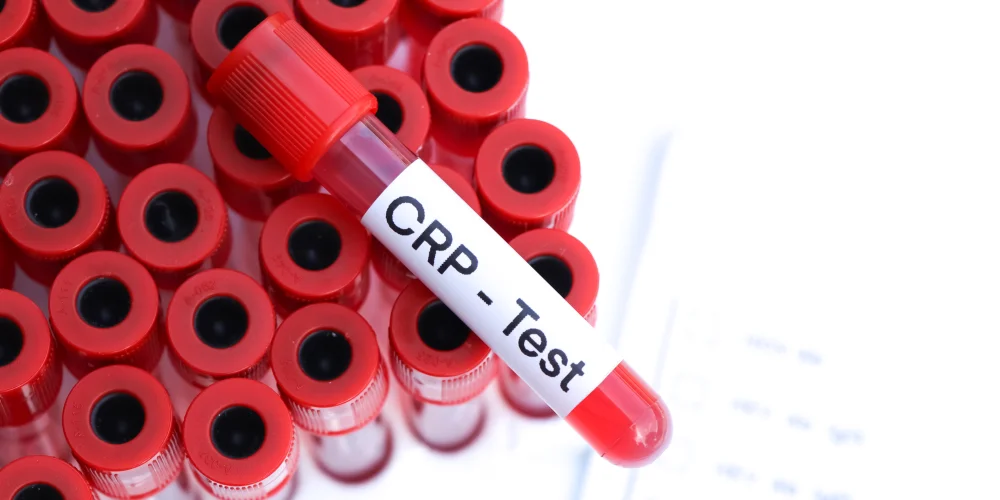CRP Test
Inflammatory Marker Assessment
The C-Reactive Protein test measures the level of C-Reactive Protein present in the blood, a protein produced by the liver in response to inflammation. Elevated C-Reactive Protein levels indicate the presence of inflammation in the body, which can be indicative of various conditions. This test is valuable in diagnosing and monitoring chronic inflammatory conditions, such as rheumatoid arthritis or inflammatory bowel disease, and assessing the severity of these conditions over time. By monitoring C-Reactive Protein levels, healthcare providers can track the effectiveness of treatments and interventions aimed at reducing inflammation and managing chronic diseases. The C-Reactive Protein test plays a crucial role in providing insights into overall health and guiding appropriate medical management strategies tailored to individual patient needs.

When is the CRP Test Prescribed?
Identification of conditions that cause inflammation C-Reactive Protein tests help detect acute inflammation triggered by injuries, infections or autoimmune diseases such as the lupus and rheumatoid arthritis. The test can also be utilized to track health-related activity during chronic inflammatory diseases.
- Cardiovascular Risk Assessment : High C-Reactive Protein levels can be linked to an increase risk of developing cardiovascular ailments, which includes heart attack and stroke. The test helps determine the level of risk for cardiovascular diseases, specifically when people have other risk factors such as hypertension or high cholesterol.
- Monitoring infections : CRP levels are elevated dramatically as a result of bacterial infections. Monitoring the C-Reactive Protein levels of patients helps health professionals monitor the efficacy of treatments and also assess the effectiveness of antibiotic treatment.
- Post-Surgical Monitoring : Following surgery C-Reactive Protein tests can reveal the existence of post-surgical problems or infections, assisting in the early detection of problems and prompt intervention.
Preparation for the CRP Test
There is no special preparation needed to undergo C-Reactive Protein Test. The patients can consume food and drinks normal prior to the exam. It is important to inform your physician of any medication, supplements or illnesses that have recently occurred, since they can affect tests results.
Parameters Considered During CRP Test
The CRP Test measures the concentration of C-Reactive Protein within the blood. It is usually measured in milligrams per Liter (mg/L). The higher C-Reactive Protein levels suggest an increased degree of inflammation within the body. This helps health professionals assess the severity of disease as well as the effectiveness of treatments.
Time Required for CRP Test Report
C-Reactive Protein Test is a rapid process. Once a blood sample has been taken the results will be available in a matter of hours. It is this speedy turnaround that permits healthcare professionals to quickly examine the level of inflammation and make an informed decision regarding their clinical care.
CRP Test Price
In Chirayu Super Speciality Hospital, the CRP Test price is Rs900. It provides access to the most crucial diagnostic tests to identify inflammation-related ailments. The cost-effective test aids in earlier detection and the management of chronic inflammatory conditions.
Book an Appointment for CRP Test
What Our Patients Say
Hear from our valued patients about their experiences at Chirayu Super Speciality Hospital and how our care has made a positive impact on their health and well-being.


Timely CRP test results allowed for early intervention. Thank you, Chirayu.


Chirayu Hospital CRP test was instrumental in diagnosing my autoimmune disease.


The CRP test was part of my routine check-up. Efficient process, highly recommended.


Grateful for Chirayu Hospital's thorough CRP testing. Professional service.


Prompt and accurate CRP test results helped guide my treatment plan effectively.


The CRP test at Chirayu Hospital provided crucial insights into my inflammatory condition.
Frequently Asked Questions
Here, we provide answers to some of the most commonly asked questions to help you better understand our services, policies, and facilities. If you have any additional questions, please do not hesitate to contact us.
High CRP levels usually indicate inflammation in the body, which can be due to infections, autoimmune diseases, or chronic conditions.
The CRP test helps assess the severity of inflammation and monitor diseases but is not used alone for specific disease diagnosis.
Yes, factors like smoking, obesity, and lack of physical activity can elevate CRP levels.
The frequency of CRP testing depends on the condition being monitored and your healthcare provider’s recommendations.
Yes, certain medications, such as corticosteroids and nonsteroidal anti-inflammatory drugs (NSAIDs), can affect CRP levels.